Interview: H.C. McEntire – Living on the Eno Axis
Formerly the frontwoman for Mount Moriah and a backing vocalist for Angel Olsen, H.C. McEntire has just released her second solo album, Eno Axis.
The particular Eno is question is the Eno River which runs just behind H.C. McEntire’s residence in North Carolina.
The 13th Floor’s Marty Duda spoke to her just recently about living on The Eno, her friendship with Angel Olsen and the loss of Justin Townes Earle. Oh and her startling cover of a classic Led Zeppelin song.
Follow H.C. McEntire: WEBSITE FACEBOOK YOUTUBE TWITTER SPOTIFY
M: So you’re in North Carolina, am I correct?
H: Yeah, North Carolina, Durham, I’m just outside of Durham.
M: I spoke to someone a few weeks ago from the same area, a guy in a band called American Aquarium. I don’t know if you’re familiar with them?
H: Oh, Yeah, yeah.
M: BJ.
H: BJ, yeah he’s a good friend, that’s awesome.
M: Oh, that’s good. I had a great chat with him, he’s a very interesting guy and his album, the new American Aquarium album is one of my favourites of the year so I was thrilled to talk to him.
H: Awesome.
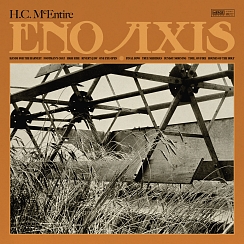 M: So your album Eno Axis has just come out last Friday was it?
M: So your album Eno Axis has just come out last Friday was it?
H: Yup, that’s right.
M: How are you feeling about it with all the stuff going on around, putting a record out in the middle of all this?
H: I mean, I’m so excited, I’m so proud of that record and I’m just so happy that folks can hear it now and you know, it’s weird not touring on the record that you just put out but it’s almost like, I don’t know, I feel really at peace with the way the album turned out so I know we’ll tour when we get to and for now I’m just super-proud of the final piece.
M: Now for folks who may not be aware, the name of the album is Eno Axis and it has nothing to do with ambient sound or Roxy Music or anything. It’s the Eno River which runs through near where you are, am I correct?
H: Yup, that’s right. The Eno river, I’m looking at it right now. I live beside the Eno State Park, Eno River State Park and the Eno river’s just an incredible, incredible, beautiful, inspiring, spiritual place and I’ve lived beside it for six years now.
M: Nice. And do you go out on the river? Is it big enough that you can go in a boat or fishing or whatever?
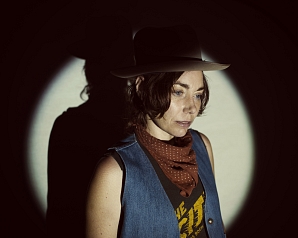 H: Yeah, there’s like a pond that’s in front of my house that kind of flows into the river. It’s not like official river but yeah, I’ve been out on the boat, a little jon boat and some of my friends kayak and stuff but I just like to look.
H: Yeah, there’s like a pond that’s in front of my house that kind of flows into the river. It’s not like official river but yeah, I’ve been out on the boat, a little jon boat and some of my friends kayak and stuff but I just like to look.
M: Fair enough. I’m more like that myself as well.
H: Yeah. There’s a quarry that you can hike to from my house about a mile hike and it’s like a swimming hole. It was made when Duke University, which is just a few miles down the road, when it was being built they used all the rocks, all the stone from it and when they were building the chapel and all that so we got a swimming hole out of it.
M: Great. So it sounds fairly rural. Is that the way it is where you are?
H: Yes. It’s outside the city limits. It’s out in the country. I live down this kind of long, winding gravel road and it’s like over a bridge and you go up a hill, you know that kind of thing.
M: Yup, I gotcha. I grew up in Western Pennsylvania when I was little back in the sixties and I’m imagining the same kind of scenario.
H: Ok, cool, yeah it’s really quiet and it’s the way I like it. I grew up in the middle of nowhere so to be able to get to like downtown Durham in like fifteen minutes is pretty great.
M: That’s cool. So you mentioned that obviously the river…you named the album after it… and it kind of inspires your songwriting so how does that work? Is it a conscious thing? Is it more of a subliminal seeping into everything you do?
H: Well, like I was saying like my house is at the very end of this road so everything around me it’s like unavoidable the nature and the State Park so it’s become a part of my daily…I mean everything is kind of, whether it’s like…right now, you can’t not hear the crickets and the frogs and you know, all of that has informed every part of my day. So I would say it’s kind of part of my identity at this point. I’ve always been a country person but there’s…you know and some people would get a little restless in the country…but it’s the stillness and the slowness has just been really great for my creative productivity, definitely on this album for sure.
M: Playing the first song, Hands For The Harvest, you pick up a distinct kind of gospel influence in what you’re doing but its not like a religious over tone it’s just like, in fact it sounds like almost like a hymn and that kind of permeates itself through the rest of the stuff as well. Would you agree that that’s kind of something that you work with?
H: Oh, absolutely yeah. I grew up in a very religious family and hymns were just…pretty much that and country music were the only things I listened to and it’s still, you know, the chord progressions of hymns, they’re a huge part of, they inform a lot of my writing, especially that song.
M: I have to tell you, the last song on the album is Houses Of The Holy which you know, I didn’t realise that it, what it was, when it was and I was thinking about Led Zeppelin thinking oh but there’s no way she’s covered Led Zeppelin so when the little intro started playing before you started singing, in my head I was singing, “Let me take you to the movies” and then you said it. I was like oh my God, it’s perfect.
H: Really?
M: It was fantastic, yes.
H: Wow.
M: What you did with the song cause it sounds obviously nothing like Led Zeppelin anymore.
H: Right. Yeah, that’s so cool.
M: It one of the songs that’s in my head constantly so what made you choose that to cover?
H: Well, I knew I wanted to cover something that was radically different and I’ve always loved those lyrics and I just love how simple they are and sweet, coming from me. I like that they had this versatility that I could transform them into…that I could transform the song really.
M: Definitely. Cause you don’t think of Led Zeppelin as being particularly sweet at any particular time.
H: No.
M: A couple of the songs I wanted to touch on, one of them is Final Bow, or is it bow?
H: Bow.
M: Bow sorry, which apparently you address issues of consumption and consumerism and commodification and whatever, so maybe you could tell me a little bit about how that came about?
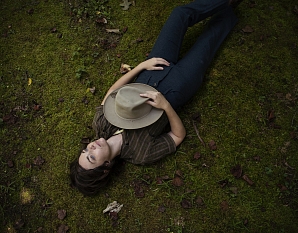 H: Sure. That song is, you know I have toured for a long time and when I wrote that song I had just gotten off the road after touring for about a solid three years, two of them with Angel Olsen, I was in her band, and then immediately went into promoting, touring on my last record. And it just felt like a machine and it’s grueling you know? And it’s, I don’t know, you don’t want to complain because there’s beautiful things about performing and it’s a big reason why I do it but when you think about being an entertainer and having to show up and, you know, I guess it’s a kind of abstract commentary on the music industry at large. Less the independent side of things but I guess I was just really struck by what I experienced as the underbelly of the industry, just the dollar signs, all that coming before mental health or things like that.
H: Sure. That song is, you know I have toured for a long time and when I wrote that song I had just gotten off the road after touring for about a solid three years, two of them with Angel Olsen, I was in her band, and then immediately went into promoting, touring on my last record. And it just felt like a machine and it’s grueling you know? And it’s, I don’t know, you don’t want to complain because there’s beautiful things about performing and it’s a big reason why I do it but when you think about being an entertainer and having to show up and, you know, I guess it’s a kind of abstract commentary on the music industry at large. Less the independent side of things but I guess I was just really struck by what I experienced as the underbelly of the industry, just the dollar signs, all that coming before mental health or things like that.
M: Do you see it getting better? Because it seems like especially mental health issues seem to be on the tip of a lot of people’s tongues these days and it didn’t used to be that way so I’m wondering if that’s a good thing?
H: Well, I think what’s happening right now, I mean, myself and so many people I know, so many artists, our lives are completely changed because of Covid. So the inability to tour has I think slowed a lot of people down and made us think and ask what do we want out of this? And oh, like some folks that I’ve talked to are like, “You know, I wanna, when things get back to quote unquote normal, I wanna restructure my life to where it’s less of a grind and more I don’t we just”, I feel like artists touring professionals are being asked to really confront that part of our jobs you know?
M: And of course, a lot of people who are songwriters like yourself are fairly sensitive souls and of course we just lost Justin Townes Earle yesterday which is very sad and you know, he had his issues and who knows if being locked down had anything to do with whatever happened to him but it’s just, you worry about people you know?
H: Yeah, he was a friend of mine and we toured together. It’s really heartbreaking and I don’t know the details of what happened but to what you’re saying, like yeah its kind of, earlier on in the quarantine, I went through an identity crisis, you know like what am I doing if I’m not playing live? But with this release, it helped me get back into my purpose and feeling confident but yeah, I think it’s, that’s the flip side of being still and you know, that part, the detrimental part of an artist in quarantine. It hits you.
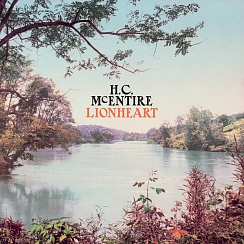 M: Yeah. Now you mentioned the fact that you had sung background with Angel Olsen and I see she’s got a new album coming out this Friday. And I know she sang on your first album on Lionheart so two things, I’m wondering if you guys hang out and talk still or whatever and singing background with her, did that have much, watching what she was doing and observing, did that have much influence on what you do now?
M: Yeah. Now you mentioned the fact that you had sung background with Angel Olsen and I see she’s got a new album coming out this Friday. And I know she sang on your first album on Lionheart so two things, I’m wondering if you guys hang out and talk still or whatever and singing background with her, did that have much, watching what she was doing and observing, did that have much influence on what you do now?
H: Yes. We were friends before I joined the band. She lives in North Carolina too and she was actually just here visiting a couple weeks ago. We’re close, we’re really close and keep in touch every other day or something like that, at least weekly and it’s been great actually going through during a pandemic, going through the psychological issues of putting out an album you know? Like we part release and that felt really empathetic and yeah, we’re good friends. But in terms of how it’s affected me as a singer, I think, I wanted to learn and I took that job. I knew what I was getting into, I just happened to really, really love her music and enough to where I felt comfortable putting my stuff on hold for a minute and you know, singing backing vocals, God it’s so hard. It’s so hard, especially when you’re singing with someone like her. You want to support her songs and support her melodies but it’s made me a better singer for sure.
M: Cool.
H: Yeah, it was a really great experience.
M: I’ve seen Angel and I know she’s come to Auckland to play and I’ve seen her, I don’t know if you were with her at the time. Do you remember?
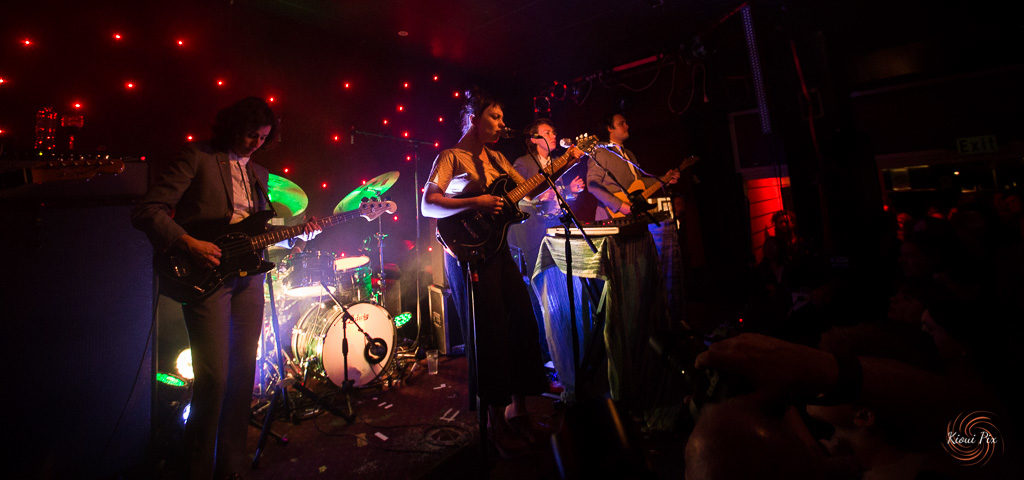 H: Yeah, I was in…we played in Auckland a couple of years ago?
H: Yeah, I was in…we played in Auckland a couple of years ago?
M: Kings Arms I think.
H: Yeah, I was there.
M: I was there too.
H: Oh, cool. That’s the only time I’ve been in New Zealand. We played I think three shows there.
M: That sounds about right. Probably Auckland, Wellington and Christchurch no doubt.
H: Yeah, I think that was right.
M: That’s the usual route. Every once in a while they go all the way down to Dunedin and that’s about it. But it’s a great place to live, I love it here.
H: How long have you been there?
M: Since 1994.
H: Wow. I bet it’s beautiful.
M: It is yeah. But you know, so is North Carolina.
M: A couple of tracks I wanted to just kind of touch on, True Meridian is one. I assume it’s not necessarily about geography. You want to touch on that a little bit?
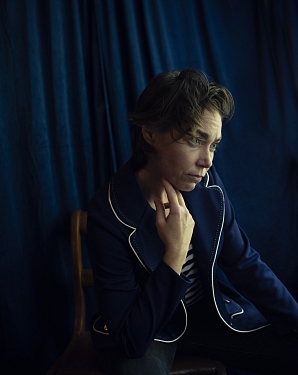 H: It is indirectly but it’s more geographical in the symbolism. I wrote that song…there’s a visual artist Naama Tsabar who came to Duke University and we collaborated through the Nasher Art Museum there on a piece and she asked me to write a song and True Meridian was that song and it sounded a little different when I first heard of it but I liked it so much I was like, I’ve gotta kind of go with this and then when the band joined up it felt…we kind of have this joke where, like the beginning of that song and some of the instrumental moments kind of feels like you’re in a canoe and you’re just slowly paddling Yeah, True Meridian.
H: It is indirectly but it’s more geographical in the symbolism. I wrote that song…there’s a visual artist Naama Tsabar who came to Duke University and we collaborated through the Nasher Art Museum there on a piece and she asked me to write a song and True Meridian was that song and it sounded a little different when I first heard of it but I liked it so much I was like, I’ve gotta kind of go with this and then when the band joined up it felt…we kind of have this joke where, like the beginning of that song and some of the instrumental moments kind of feels like you’re in a canoe and you’re just slowly paddling Yeah, True Meridian.
M: I was gonna ask you about your guitar player, keyboard player Luke as well. Is he part of your regular band? I noticed he’s in the credits there and he takes a few whacks at his guitar.
H: He sure does. Luke and I met, he was playing guitar in Angel’s band and he was living in Asheville at the time and so we just became really good friends on tour with her and he ended up moving really close by where I am and he co-produced that record with me. And I just love the way he plays guitar, it’s just so soulful you know? And I think a lot of that is he grew up playing music in church and that was how he learned…he learned through gospel music too so we kind of have that connection.
M: It’s interesting, I think when you’re growing up in small town U.S. like that, church becomes a thing for you no matter what happens and then you deal with it as you grow older I guess and find your own way around it.
H: Yeah, it’s true.
M: Alright, let’s see if we can pick out one more song to talk about before I let you off the hook. Perhaps Footman’s Coat. Is your vocal double tracked on that record, on that track?
H: No, I don’t think it is. Yeah.
M: And I was trying to decide for the lyrics, and of course when that happens usually I get it wrong but it was like, ‘trying to bribe a dark horse with an arrow and a bow’.
H: That’s right.
M: Is that really it?
H: Yeah, I’ve been trying to bribe the dark horse with an arrow and a bow. You got it.
M: Excellent. So what can you tell me about that song?
H: Well, that was actually the first song I wrote for the record. It was one of the things that I kind of set out to do with this record is challenge myself in writing in all open tunings with the guitar and that song I just set it to drop D and I was so inspired. I had just gotten pretty burnt out on the guitar and I needed a new look at it and writing that song, I don’t know, I fell back in love with the guitar. So it’s special in that way to me but when I think about that song, I think there’s obviously some interesting imagery but, I think the essence of it is I’m kind of looking back over my life and thinking about different paths I could have taken like do you remember those choose your own adventure books?
M: Which ones?
H: Choose your own adventure books?
M: Yes.
H: Yeah, turn the page… I was kind of thinking about that and just not necessarily nostalgic but just kind of observing a couple important figures in my life and I know that’s really vague.
M: No, that’s fair enough. It is what it is, that’s cool.
H: Yeah.
M: So I saw that you did some kind of show that was on YouTube about a month ago and were you playing in front of people at that point? I couldn’t see any audience so I didn’t know.
H: You know, I’m actually standing right near where I recorded that. That was, Duke Performances set up a stage and brought a team in and that was in my backyard next to my garden.
M: Nice.
H: Yeah. Everyone was in masks and it was really just the production crew allowed and a couple friends of mine but it was the first time I’ve played songs in front of some people who awkwardly couldn’t clap you know? And also I work at Duke Performances sometimes and so they’re all my co-workers. It was surreal for sure.
M: I’m sure it was. The whole world is surreal these days so there you go.
H: That’s right.
M: Strange, but hopefully we’ll get back to some kind of normalcy sometime soon and hopefully you can come down to New Zealand and play some songs for us at some point.
H: I would love that, I would love that.
M: Well good luck with everything. Thank you for talking to me and have a good day.